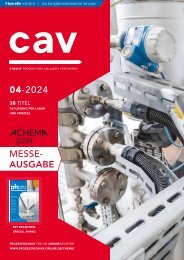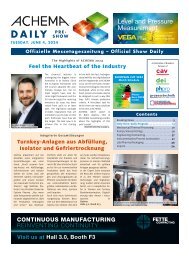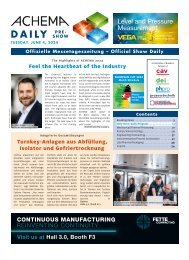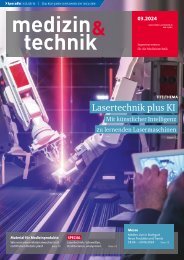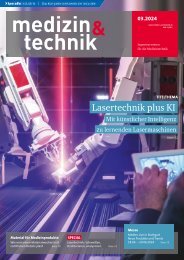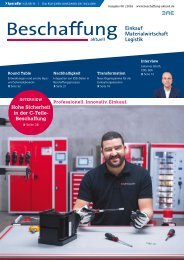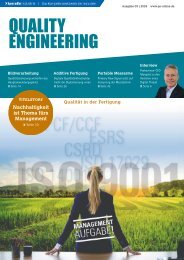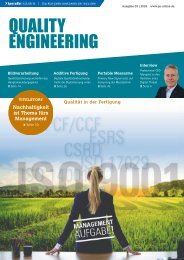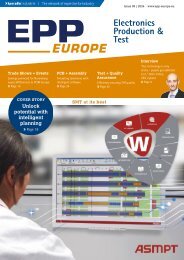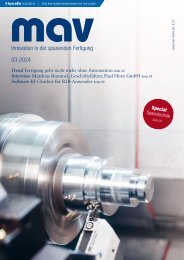cpp – Process technology for the chemical industry 01.2019
The journal cpp - Process technology for the chemical industry reports about processes, plants, apparatus and components for the chemical and pharmaceutical industry. Further topics are IT technologies, industry 4.0, digital production, MSR and automation technology and process analysis technology. The content spectrum is rounded off by explosion protection, plant safety, occupational health and safety, maintenance, site management and energy management.
The journal cpp - Process technology for the chemical industry reports about processes, plants, apparatus and components for the chemical and pharmaceutical industry. Further topics are IT technologies, industry 4.0, digital production, MSR and automation technology and process analysis technology. The content spectrum is rounded off by explosion protection, plant safety, occupational health and safety, maintenance, site management and energy management.
Create successful ePaper yourself
Turn your PDF publications into a flip-book with our unique Google optimized e-Paper software.
<strong>cpp</strong><br />
PLANTS, APPARATUS, COMPONENTS<br />
Chemical resistant diaphragm pumps <strong>for</strong> scale-up in <strong>chemical</strong> process <strong>technology</strong><br />
Scalable vacuum supply<br />
We’ve all been <strong>the</strong>re. A process works well in <strong>the</strong> laboratory, yet issues arise during<br />
scale-up to production size. Thanks to seamless vacuum <strong>technology</strong> from Vacuu brand,<br />
this may very well be a problem of <strong>the</strong> past. Individual pumps and modular vacuum<br />
systems with pumping speeds up to 120 m 3 /h allow a stable scale-up process.<br />
Mini and pilot plants in <strong>the</strong> <strong>chemical</strong> <strong>industry</strong><br />
are at <strong>the</strong> interface between lab and<br />
production scale. Numerous <strong>chemical</strong> processes<br />
such as distillation, evaporation, drying,<br />
extraction or filtration are per<strong>for</strong>med<br />
under vacuum. During scale-up, <strong>the</strong> vacuum<br />
<strong>technology</strong> has to be adapted accordingly <strong>–</strong><br />
ideally without sacrificing proven advantages<br />
from <strong>the</strong> laboratory like <strong>chemical</strong> resistance,<br />
oil-free vacuum, durability or precise<br />
vacuum control. On <strong>the</strong> laboratory<br />
scale, <strong>chemical</strong> resistant diaphragm pumps<br />
are established as <strong>the</strong> go-to <strong>technology</strong> <strong>for</strong><br />
<strong>the</strong> a<strong>for</strong>ementioned applications. A lot of<br />
processes are operated at pressures between<br />
1 and 500 mbar, falling well into <strong>the</strong> working<br />
range of diaphragm pumps. Mini and<br />
pilot plants usually require significantly<br />
higher pumping speeds than laboratory<br />
scale applications, often between 15 and<br />
100 m 3 /h. The o<strong>the</strong>r requirements mostly<br />
remain unchanged. So, why switch technologies<br />
when something tried-and-tested is<br />
available?<br />
Apart from <strong>the</strong> obvious parameters like<br />
pumping speed and ultimate pressure, o<strong>the</strong>r<br />
factors need to be considered in order to<br />
achieve <strong>the</strong> optimum layout <strong>for</strong> a vacuum<br />
supply in <strong>the</strong> <strong>chemical</strong> <strong>industry</strong>, <strong>for</strong><br />
example <strong>chemical</strong> resistance, <strong>the</strong> use of utilities,<br />
energy and maintenance costs. Taken<br />
toge<strong>the</strong>r, in <strong>the</strong> long run <strong>the</strong>y affect process<br />
reliability, availability and <strong>the</strong> total cost of<br />
ownership.<br />
Appropriate measuring and control devices,<br />
which must be designed to be as <strong>chemical</strong>ly<br />
resistant and as robust as possible, are<br />
necessary to monitor and control <strong>the</strong> process<br />
vacuum. Many of <strong>the</strong> solvents commonly<br />
used in <strong>chemical</strong> plants are flammable<br />
at atmospheric pressure and have<br />
high vapour pressures, making <strong>the</strong>m prone<br />
to <strong>for</strong>ming explosive mixtures with air. In<br />
<strong>the</strong>se cases, explosion protection, too, becomes<br />
an important factor.<br />
Pictures: Vacuubrand<br />
From small to large: <strong>chemical</strong> resistant vacuum pump with pumping<br />
speeds all <strong>the</strong> way up to <strong>the</strong> modular VAC 24seven system<br />
Oil-free pumps enable clean vacuum<br />
In <strong>chemical</strong> processes, not only air and<br />
water vapour are pumped but usually also<br />
aggressive vapours, so that vacuum pumps<br />
with high <strong>chemical</strong> resistance are a must.<br />
Due to <strong>the</strong> systematic use of fluoropolymers<br />
in all wetted areas, chemistry diaphragm<br />
pumps meet this requirement perfectly.<br />
Fur<strong>the</strong>r more, <strong>the</strong>se pumps are exceptionally<br />
tol erant of condensate. Vacuubrand manu -<br />
factures all heavy-duty components such as<br />
head covers and diaphragm clamping discs<br />
with stable metal cores combined with a<br />
thick, diffusion-tight overmould.<br />
The proven PTFE sandwich design of <strong>the</strong>se<br />
diaphragms guarantees high durability and<br />
long service intervals. Depending on <strong>the</strong><br />
application, <strong>the</strong> diaphragms typically only<br />
54 <strong>cpp</strong> 01-2019






